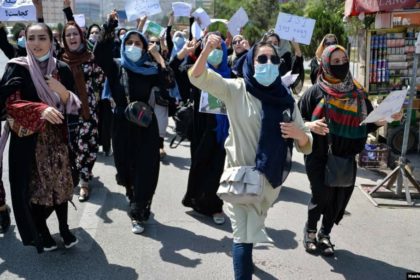RASC News Agency: In a chilling demonstration of the Taliban’s disregard for judicial procedure and detainee safety, local sources in Herat have confirmed that a woman was fatally shot during a public session of the Taliban appellate court. The victim, the wife of Abdul Rahman Moradi, a former member of the Herat Provincial Council, had been accused of murdering her husband and was brought from prison to the court for trial.
According to eyewitness accounts, the incident occurred around 10:30 a.m. on Saturday, 5th of Mizan. Authorities have reportedly detained an additional individual in connection with the shooting.
Eyewitnesses allege that the woman was killed by Abdul Rahman Moradi’s brother. The event has reopened longstanding disputes over Moradi’s death. While the Taliban previously asserted that he had committed suicide, his family continues to hold his wife responsible, illustrating the deep contradictions and lack of transparency within the Taliban-controlled judicial system.
The circumstances surrounding the shooting raise serious questions about court security and procedural integrity under Taliban rule. How the accused was able to access a firearm inside a court session remains unclear. Some sources claim that a Taliban operative either facilitated the smuggling of the weapon into the courtroom or directly provided it to the accused, highlighting systemic negligence and the regime’s complicity in enabling violence.
To date, Taliban authorities in Herat have remained silent, providing no official explanation. The incident has intensified concerns regarding the safety of detainees and the complete erosion of basic judicial norms. Observers argue that such failures are emblematic of a broader pattern in which the Taliban use the courts not to administer justice but as tools of intimidation, coercion, and arbitrary power.
This case underscores the Taliban’s systemic incapacity or deliberate unwillingness to uphold rule-of-law standards, leaving defendants vulnerable even in formal legal settings. The broader implication is stark: under the Taliban, no one can expect security, transparency, or accountability within the justice system. Judicial spaces, which should guarantee fairness and protection, have become arenas of fear, with the lives of accused individuals placed in jeopardy.
Human rights observers warn that incidents like this reveal the regime’s calculated approach to governance through terror and impunity. By permitting or even enabling lethal violence within their own courtrooms, the Taliban reinforce a culture of fear that suppresses dissent and reinforces their authoritarian control. The case in Herat is not an isolated failure but a telling illustration of the systemic brutality that defines Taliban rule across Afghanistan, further eroding public trust and undermining the very concept of justice.






